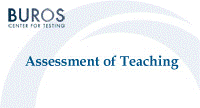Buros-Nebraska Series on Measurement and Testing

Assessment of Teaching: Purposes, Practices, and Implications for the Profession
Date of this Version
1990
Document Type
Article
Citation
From: Assessment of Teaching: Purposes, Practices, and Implications for the Profession, edited by James Y. Mitchell, Jr., Steven L. Wise, and Barbara S. Plake; Series Editor Jane Close Conoley (Hillsdale, New Jersey, Hove & London: Lawrence Erlbaum Associates, 1990)
Abstract
The Discovery Channel on TV has some terrific programming. Not too long ago I watched a scientist explain why it is that the position of a stranded boat will not change even when it is tossed around by giant storms. The theory is that waves move across the water rather than the water itself moving. The wave moves along in a circular motion, propelled by big or small forces depending on what started it in the first place. As long as nothing interrupts the roll of the wave, it will pass and leave everything as it was before.
At the time, I was in the process of collecting my thoughts for this presentation, reflecting on the rising tide of mediocrity, which you will recall was the alarm raised several years ago by the report A Nation At Risk. One of the many outcomes of the increased scrutiny provoked by that and other reports has been the reform of our thinking about appraisal. But long before that, teachers had been bobbing along in a dangerous and stormy sea and the only rising tide they knew about was the criticism that was threatening to swamp them. Anyway, teacher organizations tried to applaud the reports 'as a welcome SOS. And sure enough, very quickly they were surrounded by would-be heroes and rescuers. Unfortunately, most offers of help have presented new dangers and it has been difficult to distinguish flotsam and jetsam from a life raft. Teachers still aren't at all sure what appraisal reform will turn out to be.
Now for those of you who wish I hadn't started out that way, let me sympathize. You believe that appraisals are an important key to positive change. Your strategy for surviving the onslaught of criticism is to elevate standards and prove accountability. You think I should suspend my cynicism and throw myself wholeheartedly into a project to document success. Resistance, you say, fuels the fires in the critics' eyes-And you're right.
Resistance makes schools look unresponsive, and makes people believe that educators are lazy. And it's true that lazy teachers don't want to change, incompetent teachers can't change, unions want to protect the weak, and stubborn teachers become bad press. And you're right in thinking that I'm going to preach a sermon you have probably heard before. I have a negative message to deliver, and if you take me seriously you're going to experience frustration.
To begin with, here are some additional possibilities that I ask you to consider. There are other reasons educators might resist reforms. For example, good teachers don't want to continually be changed. Good teachers want to be left alone to do what they do well . Good teachers think they improve their performance best with experience, inspiration, sharing, and freedom to plan and dream.
Good teachers don't understand why the public doesn't value what they do and they feel bitter when they think about it. They certainly don't understand why they should interrupt their teaching to process paperwork that will tell the public how well they were teaching before they were so rudely interrupted.
It is also true that a significant majority of teachers belong to organizations that serve as unions as well as professional associations. Those unions work to insure that all teachers, weak or strong, have due process rights. But members of these unions have never enjoyed any unbridled powers. We do not hire and fire teachers, and we do not grant tenure. The vast majority of our members can't understand why school districts would not terminate the employment of teachers who are an embarrassment to the profession. Teachers are very unhappy when they are blamed for that failure. And they are frustrated that those perceived failures stand in the way of fair and reasonable funding for education and deprive them of resources to do the job.
These are the conflicts that rage in the everyday world of teachers. No matter how well meaning and reasonable those responsible, these are conflicts which alternately threaten the teaching profession and the health of public education.
Included in
Educational Administration and Supervision Commons, Educational Assessment, Evaluation, and Research Commons


Comments
Copyright © 1990 by Lawrence Erlbaum Associates, Inc. Digital Edition Copyright © 2012 Buros Center for Testing. This book may be downloaded, saved, and printed by an individual for their own use. No part of this book may be re-published, re-posted, or redistributed without written permission of the holder of copyright.